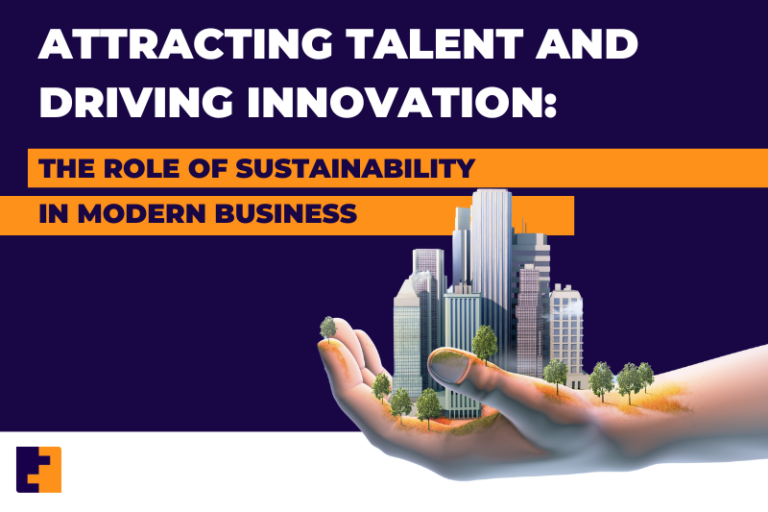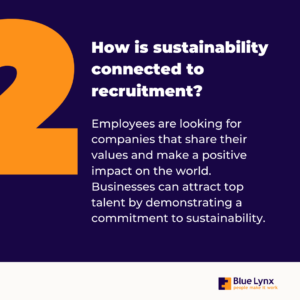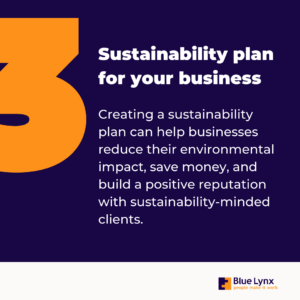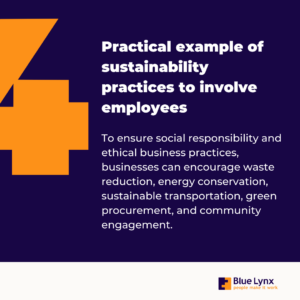Attracting Talent and Driving Innovation: The Role of Sustainability in Modern Business

Sustainability has become a buzzword in modern business and for good reason. Аccording to the International Energy Agency, global CO2 emissions from energy use rose by 1.5 billion tonnes in 2021, reaching a new all-time high.
With the effects of climate change becoming more apparent each year, businesses have a tremendous responsibility.
The role of sustainability in modern business is multifaceted. On one hand, businesses have a responsibility to reduce their environmental impact, both in terms of greenhouse gas emissions and waste. This can involve a range of strategies, from using renewable energy sources, reusing or recycling, to reducing waste in the production process. These strategies not only benefit the environment, but they can also save businesses money in the long run.
Sustainability also plays a crucial role in meeting the expectations of consumers. Today’s consumers are more environmentally conscious than ever before, and they expect the businesses they patronise to reflect those values. By incorporating sustainability into their business practices, companies can appeal to this growing market and differentiate themselves from competitors.
In addition to meeting consumer expectations, sustainability can also be a key driver of innovation and growth. As companies seek to reduce their environmental impact, they are forced to think creatively and come up with new solutions to old problems. This can lead to the development of new products and services, as well as new business models that prioritise sustainability.
Sustainability and businesses in the Netherlands
The Netherlands is known for its sustainable policies and practices, and sustainability is becoming an increasingly important issue for businesses operating in the country.
The Dutch government has set ambitious sustainability goals, including a target to reduce greenhouse gas emissions by 49% by 2030. The government also provides subsidies and other incentives to encourage businesses to adopt sustainable practices.
The country is also a leader in the circular economy, which focuses on minimising waste and maximising the use of resources. Many Dutch businesses are working to create products and services that can be reused, repaired, or recycled.
Sustainable transportation
The Netherlands is known for its bike-friendly culture and has invested heavily in sustainable transportation infrastructure. Many businesses encourage their employees to bike or use public transportation to reduce their carbon footprint.
Sustainable practices expand to agriculture agricultural products as well. Many Dutch farms are adopting practices like precision agriculture and using renewable energy sources to reduce their environmental impact.
Sustainable building
The Netherlands is home to some of the most sustainable buildings in the world. According to the US Energy Information Administration, commercial buildings consume 19% of all energy used in the United States.
In contrast, many Dutch businesses are incorporating sustainable building practices. For example – using energy-efficient materials and renewable energy sources, in their facilities.
How is sustainability connected to recruitment?
Sustainability is becoming increasingly important to job seekers, particularly among younger generations, and can impact a company’s ability to attract and retain talent.
Here are a few ways in which global business and sustainability are connected to recruitment:
- Attracting job seekers
Companies that prioritise sustainability may be more attractive to job seekers who are looking for a sense of purpose and want to work for an organisation that aligns with their values. By highlighting their sustainability efforts in job postings and recruitment materials, companies can attract candidates who are passionate about sustainability and are a right cultural fit as well.
- Employee engagement
Employees who are engaged in sustainability efforts may be more motivated and committed to their work. By involving employees in sustainability initiatives and making them a part of the company culture, companies can increase employee satisfaction and retention.

- Reputation
Companies with a strong commitment to sustainability may have a better reputation among clients, investors, and other stakeholders. A positive reputation can attract job seekers who want to work for a company with a strong brand and may help companies stand out in a competitive job market. For example, according to a survey by Cone Communications, 81% of consumers say that they would be more likely to purchase a product if a company makes a strong commitment to social or environmental issues.
- Innovation
Sustainability can drive innovation, and companies that prioritise sustainability may be more innovative and forward-thinking in their approach to business. By attracting innovative employees, companies can stay ahead of the curve and remain competitive in their industry.
Sustainability plan for your business
Creating a sustainability plan for your business can help you reduce your environmental impact, save money, and build a positive reputation with customers who care about sustainability.
Firstly, it’s advisable to assess your current environmental impact.
Did you know that according to the United Nations, global demand for freshwater is projected to exceed supply by 40% by 2030?
Conduct a comprehensive audit of your business operations, including energy and water usage, waste generation, transportation, and supply chain. This will help you identify areas where you can make improvements and set sustainability goals – short and long-term ones. Based on your assessment, set realistic and measurable goals for reducing your environmental impact.
Your goals should be specific, measurable, achievable, relevant, and time-bound (SMART).

Once you have set your goals, develop a strategy to achieve them. This may involve implementing new processes or technologies, changing behaviour, or partnering with suppliers who share your sustainability values.
Your employees are key to implementing and sustaining your sustainability plan. Engage them in the planning process, educate them on sustainability practices, and incentivise them to make changes in their behaviour.
Once the sustainability plan has been established, you need a system for tracking progress toward your goals. This will help you identify areas where you are making progress and where you need to make improvements.
Share your sustainability plan and progress with your customers, employees, and stakeholders. This will help build trust and loyalty and may attract new clients with whom you’d share a common goal.
Continuously improve: Sustainability is an ongoing process. Regularly evaluate your sustainability plan and adjust it as needed to ensure that you are making progress and achieving your goals.
5 Ideas for sustainable practices to involve employees
If your business is keen to adopt a sustainability plan but you don’t know where to start:
Here are some practical examples of sustainability practices that can involve employees:
- Waste reduction
Encourage employees to reduce waste by providing recycling bins, reusable mugs and water bottles, and implementing a “paperless” policy where possible. Consider holding a waste reduction challenge or competition to encourage participation and generate excitement around sustainability.
- Energy conservation
Encourage employees to conserve energy by turning off lights and electronics when not in use, using natural light whenever possible, and adjusting thermostats to save energy. Consider implementing an energy audit to identify areas for improvement and involve employees in the process of finding solutions.

- Sustainable transportation
Encourage employees to use sustainable transportation options, such as biking, walking, or taking public transit. Did you know that almost 700 million metric tons of CO2 pollution can be saved yearly if everyone rode their bikes every day like the Dutch? Provide bike racks and shower facilities for employees who bike to work, and consider offering incentives or rewards for employees who use sustainable transportation options.
- Green procurement
Involve employees in the procurement process by encouraging them to consider sustainability factors when purchasing products and services. This can include choosing suppliers with strong sustainability policies, selecting products made from sustainable materials, and reducing packaging waste.
- Community engagement
Involve employees in sustainability initiatives that benefit the community, such as volunteering for local environmental organisations, participating in community clean-up events, or supporting sustainable agriculture initiatives. This can help to build a sense of purpose and engagement among employees and can also help to improve the company’s reputation in the community.
Overall, involving employees in sustainability practices requires a commitment from company leadership and a clear strategy for engaging employees. By providing education, empowerment, and recognition, companies can create a culture of sustainability that drives positive change and engages employees in the process.
Nowadays, sustainability is not just another greenwashing term – it’s a necessity for modern businesses. By incorporating it into their business practices, companies can reduce their environmental impact, meet consumer expectations, drive innovation, and attract top talent.
To effectively incorporate sustainability into their business practices, companies must take a holistic approach. This includes not only reducing their environmental impact but also ensuring that their business practices are socially responsible and ethical. This can involve strategies such as paying fair wages and ensuring safe working conditions for employees, as well as engaging with and giving back to local communities.
But sustainability is more than just a business strategy – it’s a lifestyle and a way of thinking, and operating that prioritises both financial success and social responsibility. Businesses that embrace sustainability can create a competitive advantage that will benefit them for years to come and leave behind a better world for the next generations.

